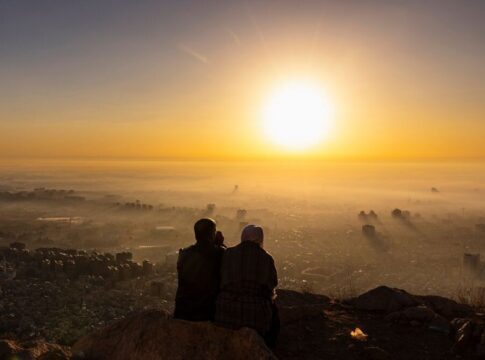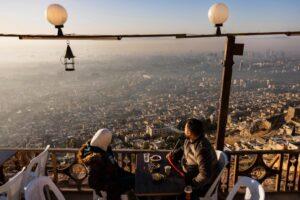DAMASCUS — As the sun rose over Damascus, Afaf Mohammed stood atop Mount Qasioun, gazing at the city below with a sense of peace and freedom she hadn’t felt in over a decade. This iconic mountain, once out of reach during the tumultuous years of Syria’s civil war, is now a beacon of hope and renewal for the people of Damascus.
For years, Mount Qasioun was a strategic military point, its panoramic views exploited for warfare rather than enjoyment. The fall of Bashar al-Assad’s regime has changed that narrative, allowing the people to reclaim this cherished space. Afaf, a dentist in her thirties, shared her overwhelming emotion with us: “After 13 years of hardship, standing here feels like a dream. It’s as if we’ve been given our city back.”
The civil war, which erupted in 2011, saw Mount Qasioun transformed into a fortress, inaccessible to the public. Now, as peace slowly returns, the mountain is drawing crowds eager to reconnect with their homeland. The once-restricted summit is alive with the sounds of laughter, music, and the clinking of tea glasses. Families picnic under the stars, and the night sky is occasionally lit up with fireworks—a stark contrast to the artillery fire that once echoed from these heights.
Mohammed Yehia, who previously earned a living selling snacks here, is delighted to return. “This place was more than a livelihood; it was a part of our identity. Being back feels like coming home,” Yehia said, recalling how he used to bring his young son to admire the sprawling cityscape.
Dr. Lina Khatib, a Middle East analyst at Chatham House, comments on the significance of Mount Qasioun reopening: “Public spaces are crucial for healing and rebuilding community trust. Qasioun is not just a mountain; it’s a symbol of recovery for Damascus.”
While the path to recovery is fraught with challenges, the reopening of Mount Qasioun is a testament to the resilience of the Syrian people. It offers a glimpse into a future where shared spaces can foster unity and hope.
Though security forces are present, ensuring safety amidst the newfound freedom, their presence is unobtrusive, allowing the spirit of celebration to take center stage. The mood atop Qasioun reflects a broader sense of optimism in Syria as citizens begin to rebuild their lives and communities.
Malak Mohammed, who visited the mountain with her sister Afaf, expressed the sentiment of many: “Returning here feels like reclaiming a piece of our past and stepping into a hopeful future. It’s a reminder that no matter how dark the times, light eventually finds its way back.”
As Syria navigates its post-conflict path, the reopening of Mount Qasioun stands as a poignant reminder of the enduring spirit of its people. For Damascus, the mountain is more than just a vantage point—it is a symbol of renewal, resilience, and the promise of brighter days ahead.



